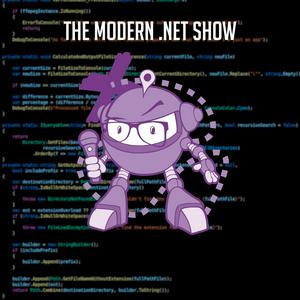Deploying With Confidence: Sam Gomez on Terraform, Bicep, and Infrastructure as Code
Show Notes "If you talk to people that have been doing Terraform for many years, they're going to tell you that, "Terraform is the law and Terraform is the way to go." But like you said, there's different tools, I would say, or languages that you can use for infrastructure as code. And it really depends what you want to do, what your developers are used to or are comfortable with and what works with your organization as it should be with any tool in software development. You got to grab the one or use the one that is more appropriate for your use case, your scenario, your organization"— Sam Gomez Welcome friends to The Modern .NET Show; the premier .NET podcast, focusing entirely on the knowledge, tools, and frameworks that all .NET developers should have in their toolbox. We are the go-to podcast for .NET developers worldwide, and I am your host: Jamie "GaProgMan" Taylor. In this episode, Sam Gomez joined us to talk about Infrastructure as Code, why you might want to think about using something like Terraform and Bicep, and how they can help you to automate your deployments to the public cloud. Sam also talks about best practises for CI/CD and ways to test your Infrastructure as Code ahead of running it--something that we've all felt the pain of in the past, I'm sure. "Terraform has what's called validation for your parameters. So like I said, you can set up a validation that says, "the only values for the SKU for a SQL server are basic," for example. And if somebody tries to give a different value to that particular parameter, it'll stop automatically and say, "okay, this validation has failed. You know, the value allowed is this one." You can do the same thing with Bicep. So that's another added layer of protection against making these kind of mistakes and adding or configuring the wrong values in your deployments"— Sam Gomez Anyway, without further ado, let's sit back, open up a terminal, type in `dotnet new podcast` and we'll dive into the core of Modern .NET. Podcasthon 2025! One last thing before we start the episode: we're super happy to participate in the 3rd edition of Podcasthon For one week, more than a thousand podcasts will highlight a charity of their choice. And today, I have the pleasure of welcoming Andy's Man Club to the show. Throughout this episode, I'll interrupt the conversation a few times to talk about the importance of mental fitness. The reason that I've picked Andy's Man Club is because mental health support is very important to me. I've used their groups for almost two years and have had the honour of being asked to step up and help run one of those groups. If you'll forgive the name for now, Andy's Man Club is a UK-based charity which organises weekly, informal, peer-to-peer talking groups for anyone over the age of 18 who identifies as male. I'll talk more about Andy's Man Club later in the episode. Supporting the Show If you find this episode useful in any way, please consider supporting the show by either leaving a review (check our review page for ways to do that), sharing the episode with a friend or colleague, buying the host a coffee, or considering becoming a Patron of the show. Full Show Notes The full show notes, including links to some of the things we discussed and a full transcription of this episode, can be found at: https://dotnetcore.show/season-7/deploying-with-confidence-sam-gomez-on-terraform-bicep-and-infrastructure-as-code/ Music Used In This Episode This contains some copyright free music during the interstitials. Each of the pieces of music (linked below) were created by YouTube user HoobeZa, and we thank them for making their work free to use. If you liked the music we used, check out links to the pieces below: "Lounge" "Mellow" "Golden" "Release" Podcasthon 2025 This episode of the podcast contains support for both Podcasthon, Andy's Man Club, and Capes on the Couch. Please feel free to check out both projects at the links below. Podcasthon! Andy's Man Club Capes on the Couch And please remember to check in on your own mental fitness from time to time. Useful Links Sam on LinkedIn Dad's in Tech The bus factor Terraform Registry Azure Verified Modules Bicep for VS Code Terraform extension for VS Code Terraform CNCF Hashicorp Developer Website Sam's MVP profile Sam on X Sam on BlueSky Supporting the show: Leave a rating or review Buy the show a coffee Become a patron Getting in Touch: Via the contact page Joining the Discord Remember to rate and review the show on Apple Podcasts, Podchaser, or wherever you find your podcasts, this will help the show's audience grow. Or you can just share the show with a friend. And don't forget to reach out via our Contact page. We're very interested in your opinion of the show, so please get in touch. You can support the show by making a monthly donation on the show's Patreon page at: https://www.patreon.com/TheDotNetCorePodcast. Music created by Mono Memory Music, licensed to RJJ Software for use in The Modern .NET Show
